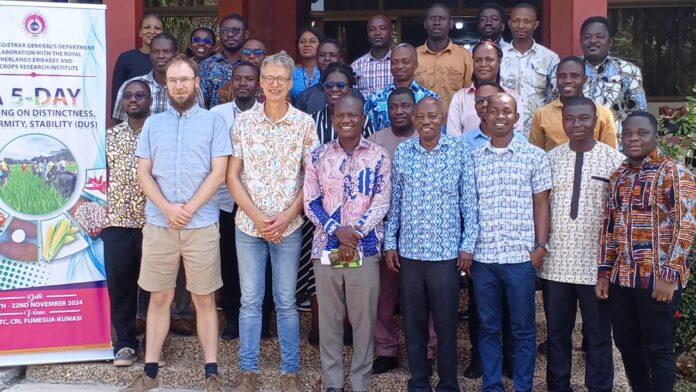The Crops Research Institute of the Council for Scientific and Industrial Research (CSIR-CRI) is investing in the harmonization of a standard for the adoption of plant varieties in the sub-region.
The researchers observe that many grains and other crops traded between countries in West Africa usually undergo multiple certifications despite being approved in its country of origin.
The institute believes a standardized and improved plant variety that conforms to the Plant Variety Protection Act (2020) could foster regional agricultural growth while ensuring food security.
The Crops Research Institute organized a five-day training for experts involved in the development and release of new plant varieties in Ghana in conformity with the Plant Variety Protection Act 2020.
Following its implementation in the fourth quarter of 2023, the Ghana Industrial Property Office is conducting workshops to keep actors in the sector breast of the new act.
The new act would ensure crop varieties meet the criteria of Distinctness, Uniformity, and Stability (DUS) to qualify as improved varieties, consistent across generations, even under changing climatic breeders on DUS standards.
Acting Director of the CSIR-CRI, Dr. Ernest Baafi highlighted the need for a shift from traditional national breeding methods, which have not been effective.
He notes that crop varieties previously released in Ghana underwent separate approval in another country, creating inefficiencies.
He believes the harmonization aims to streamline these processes, fostering regional agricultural growth.
“We are now doing what we call harmonization of crop varietal development and release. And by that, it suggests that previously if we had released crop varieties in Ghana, and those varieties had a market nature in another country like Burkina Faso, then it is expected that, that crop variety would have also go through the procedure in that country. Also, the procedure for crop developing the variety used to vary from country to another which was not helping in our sub-region,” he noted.
Dr. Baafi also noted that advancements in crop varietal development have sustained food security.
This new system, he added, is a significant step toward strengthening the region’s agricultural resilience.
Selected technical staff of the Crops Research Institute and the Savannah Agriculture Research Institute of the CSIR, the KNUST and West African Centre for Crop Improvement (WACCI) of the University of Ghana were participants of the workshop.
A plant breeder at the University of Ghana’s West Africa Sector for Crop Improvement, Mawulawoe Awity, emphasized the importance of developing crop varieties that are distinct, uniform, stable, and capable of yielding well across different agro-ecological zones.
She stresses the need for ongoing training for breeders to understand the criteria for releasing crop varieties and calls for increased government investment in agricultural research.
She also noted that much of the current research relies on donor funding, which drives the development of new crop varieties despite challenges like prolonged droughts.
She believes that substantial investment in research centers is essential to ensure progress in breeding and achieving food security.
“We still need a lot of investment from the part of government, and we would always need it from the part of government because they are the ones supposed to drive the work we do because the work doesn’t benefit the breeders but the government,” said the plant breeder.

